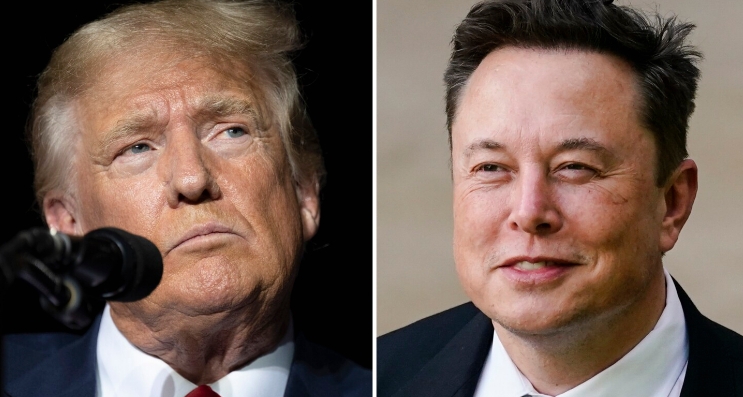Elon Musk Rallies Against Trump Tax Bill as Trump Seeks to Abolish Debt Limit
In the dynamic arena of U.S. fiscal policy, two influential figures have recently taken center stage with their outspoken positions on critical economic matters. Trump has proposed abolishing the debt


In the dynamic arena of U.S. fiscal policy, two influential figures have recently taken center stage with their outspoken positions on critical economic matters.
Trump has proposed abolishing the debt limit entirely, a stance that has unexpectedly aligned him with progressive Senator Elizabeth Warren. Concurrently, Elon Musk, who has just left the DOGE department recently, has mounted a vigorous campaign urging Americans to oppose Trump’s expansive tax bill, citing its potential to destabilize the nation’s finances.
These developments underscore the intense debates surrounding government borrowing, spending, and taxation in US economic landscape.
The Debt Limit: A Controversial Cap
The debt limit, or debt ceiling, is a statutory cap on the total amount of money the U.S. Treasury can borrow to fulfill the federal government’s financial commitments. These obligations include Social Security payments, military expenditures, and interest on the national debt.
Historically, the debt limit has been a flashpoint in Washington, frequently leveraged by both parties during budget negotiations. Failure to raise it risks government shutdowns or, worse, a default—an event that could trigger severe economic fallout. A notable example occurred in 2011, when a standoff between the Obama administration and congressional Republicans pushed the U.S. to the brink of default, also known as 2011 debt-ceiling crisis, resulting in a historic downgrade of the nation’s credit rating by Standard & Poor’s.
Donald Trump has repeatedly called for the debt limit to be “thrown out entirely,” arguing that it serves as an unnecessary obstacle to economic stability. In a recent social media post, he stated, “The Debt Limit should be entirely scrapped to prevent an Economic catastrophe.”
This position has found a surprising echo in Senator Elizabeth Warren, who wrote on social media, “The debt limit should be scrapped to prevent an economic catastrophe. Let’s pass a bipartisan bill and get rid of it forever.” This rare convergence between two political opposites highlights a shared concern: the debt limit’s potential to incite crises through political brinkmanship.
Treasury Secretary Scott Bessent recently warned Congress that without an increase by August, the government could struggle to meet its obligations, amplifying the urgency of this debate.
Musk’s Crusade Against the Tax Bill
Parallel to the debt limit discussion, Elon Musk has emerged as a vocal critic of Trump’s proposed tax legislation, tentatively titled the “Economic Growth and Tax Reform Act.”
The bill seeks to overhaul the U.S. tax code with measures such as reducing the corporate tax rate from 35% to 21%, offering temporary individual tax cuts, and raising the debt ceiling by $4 trillion. However, it also phases out the $7,500 electric vehicle tax credit by 2025—a move that directly threatens Tesla’s bottom line. Despite an unsuccessful appeal to House Speaker Mike Johnson to preserve the credit, Musk has broadened his opposition, focusing on the bill’s fiscal implications.
Musk has taken to social media to rally public resistance, writing, “Call your Senator, Call your Congressman. Bankrupting America is NOT ok!” He has labeled the legislation a “disgusting abomination,” pointing to its projected $2.4 trillion addition to the national debt over the next decade, as estimated by the Congressional Budget Office (CBO). The CBO’s analysis details a $3.67 trillion revenue drop offset by a $1.25 trillion spending reduction, though it excludes potential economic growth effects touted by supporters. Musk’s stance pits him against Trump at a pivotal moment, as the former president lobbies Republican holdouts to pass the bill. This tension follows Musk’s recent exit from leading Trump’s Department of Government Efficiency, further straining their relationship.
The White House defends the tax bill, asserting it “unleashes an era of unprecedented economic growth.” Speaker Johnson has dismissed Musk’s critique, claiming the tax cuts will self-finance through expanded economic activity—a view contested by fiscal hawks and independent analysts who warn of ballooning deficits.
Weighing the Implications
Eliminating the debt limit could streamline federal funding and avert default risks, offering stability to markets and government operations. However, detractors argue it removes a critical restraint on spending, potentially accelerating debt growth at a time when the national debt already exceeds $36 trillion. The bipartisan support from Trump and Warren suggests a window for reform, yet it raises questions about long-term fiscal discipline.
Conversely, the tax bill presents a high-stakes gamble. Advocates contend that tax reductions will boost investment and consumption, driving GDP growth and mitigating revenue losses. Critics, including Musk, counter that the $2.4 trillion deficit increase could elevate interest rates, crowd out private investment, and strain economic resilience. Economists remain split: some foresee short-term gains, while others predict long-term vulnerabilities. Musk’s influence—bolstered by his $290 million in political donations this year—adds weight to the opposition, potentially swaying public and legislative sentiment.
Looking Ahead
The U.S. stands at a fiscal crossroads. Trump’s push to dismantle the debt limit and Musk’s campaign to derail the tax bill reflect profound concerns about America’s financial trajectory. Resolution of these issues—whether through bipartisan consensus or partisan gridlock—will shape economic policy for years to come. As lawmakers grapple with these proposals, the balance between growth, stability, and fiscal responsibility remains a defining challenge.
Disclaimer: The views in this article are from the original Creator and do not represent the views or position of Hawk Insight. The content of the article is for reference, communication and learning only, and does not constitute investment advice. If it involves copyright issues, please contact us for deletion.